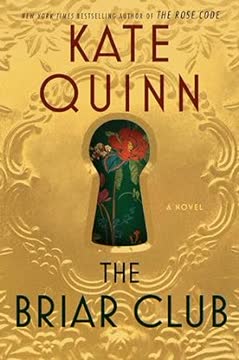Plot Summary
Seeds of Division
In early 1930s Berlin, Sofie von Meyer Rhodes lives a privileged life, largely insulated from the political turmoil brewing around her. Her best friend, Mayim, is Jewish, and the two women's bond is deep, forged in childhood. But as the Nazi party rises, anti-Semitic rhetoric seeps into everyday life, even among friends. Sofie's social circle, including the ambitious Lydia and her husband Karl, begin to embrace the new regime, rationalizing their choices as necessary for stability. The subtle, then overt, exclusion of Mayim foreshadows the coming catastrophe. Sofie, pregnant and newly married to the idealistic rocket scientist Jürgen, is forced to confront the growing chasm between her values and the world around her, as the seeds of division are sown in both her country and her closest relationships.
Dust and Desperation
Across the Atlantic, Lizzie Davis and her brother Henry struggle to keep their family farm afloat in the Texas Panhandle during the Great Depression and Dust Bowl. The land, once fertile, is now choked with dust, and hope is as scarce as rain. Lizzie's pragmatic resilience is tested as her family faces financial ruin, the loss of livestock, and the slow erosion of their way of life. The relentless storms and economic hardship force Lizzie and Henry to make impossible choices, including borrowing money from Judge Nagle, which will haunt them for years. The chapter sets up a parallel between the slow, grinding devastation of the land and the moral erosion happening in Germany, as both families are battered by forces beyond their control.
Arrival in Huntsville
In 1950, Sofie and her children arrive in Huntsville, Alabama, to reunite with Jürgen, who has been brought to America under Operation Paperclip to work on the U.S. rocket program. The family is met with suspicion and open hostility, both from Americans and fellow German émigrés. Sofie is unsettled by the segregation and racism she witnesses, recognizing echoes of the divisions she left behind. The German community is tight-knit but fractured by secrets and guilt. Sofie's attempts to build a new life are complicated by the unresolved traumas of war, the loss of her eldest children, and the ever-present threat of exposure.
Shadows of the Past
As Sofie and Jürgen settle into their new life, the past is never far behind. Their marriage, once a partnership of equals, is strained by years of separation, grief, and the moral compromises they made to survive the Nazi regime. Jürgen's work for the Americans is both a lifeline and a source of shame, as his true history has been sanitized for the sake of Cold War expediency. The couple's neighbors, both American and German, are wary, and rumors swirl about their wartime activities. Sofie is forced to confront the reality that no one, including herself, emerged from the war unscathed or innocent.
The Price of Survival
Through flashbacks, the narrative reveals how Sofie and Jürgen were gradually ensnared by the Nazi state. Jürgen's expertise in rocketry made him valuable, and when he refused to join the Nazi rocket program, the regime retaliated by firing him and threatening his family. The couple's attempts to resist are crushed by the machinery of surveillance and coercion. Mayim, Sofie's beloved friend, is eventually forced to flee, and Sofie is complicit in her erasure, torn between loyalty and fear. The chapter explores the impossibility of moral purity under totalitarianism, as every choice is tainted by survival.
American Hostilities
In Huntsville, the arrival of German scientists and their families is met with a mix of curiosity, resentment, and outright hostility. Lizzie, now married to Calvin Miller, an American engineer, is deeply suspicious of the Germans, especially those rumored to have Nazi pasts. Her brother Henry, traumatized by his experiences liberating a concentration camp, is particularly haunted and unstable. The American wives are divided—some eager to befriend the newcomers, others, like Lizzie, determined to keep them at arm's length. The town's own racial segregation and hypocrisy are laid bare, as Sofie is confronted with the uncomfortable parallels between American and German histories of exclusion.
Fractured Friendships
Sofie's attempts to find community are stymied by suspicion from both sides. The German wives, many of whom harbor their own secrets, ostracize her due to Jürgen's rumored involvement in Nazi atrocities. American women, led by the influential but embittered Lizzie, spread rumors and discourage friendships. Even well-meaning allies like Avril have their own agendas. The isolation is compounded by the struggles of Sofie's children to fit in, as they are shunned by both American and German peers. The chapter highlights the enduring power of gossip, the fragility of trust, and the ways in which women are both victims and enforcers of social boundaries.
Indoctrination and Innocence Lost
Flashbacks to Nazi Germany show the devastating impact of state indoctrination on Sofie's children, Georg and Laura. Despite Sofie's efforts to shield them, the relentless propaganda of the Hitler Youth and school system warps their values, turning them into strangers. Georg is eventually sent to fight and is killed, while Laura becomes estranged, unable to let go of the ideology that defined her formative years. In America, Sofie's younger children struggle with their own identity crises, caught between cultures and histories. The chapter explores the generational cost of hate and the difficulty of reclaiming innocence once it is lost.
Complicity and Conscience
Jürgen's work at Mittelwerk, the underground rocket factory, is revealed to have been built on the suffering and deaths of thousands of forced laborers, many of them Jews. Sofie, initially shielded from the worst realities, is eventually confronted with the truth. Both are tormented by their roles—Jürgen as a reluctant participant, Sofie as a bystander who chose family over resistance. The couple's attempts to take a stand are crushed by the regime's brutality, and their survival comes at the cost of their integrity. The chapter grapples with the limits of personal responsibility and the corrosive effects of guilt.
The Cost of Silence
In both Germany and America, silence is a survival strategy, but it comes at a steep price. Sofie and Jürgen's sanitized past is a fragile shield, easily shattered by rumor or investigation. Lizzie's silence about her brother's deteriorating mental state enables tragedy. The American authorities, eager to benefit from German expertise, turn a blind eye to inconvenient truths. The chapter interrogates the ways in which silence can be both protective and destructive, and how the refusal to speak out perpetuates cycles of harm.
The Breaking Storm
The simmering tensions in Huntsville explode when Henry, in the grip of paranoia and trauma, shoots Jürgen, convinced he is a threat. The incident exposes the fault lines in the community—between Americans and Germans, between past and present, between justice and mercy. Sofie is arrested, and Lizzie, desperate to protect her brother, nearly sacrifices herself. The aftermath forces all involved to confront the consequences of their choices, as the personal and historical collide in a moment of crisis.
Aftermath and Reckoning
The legal and emotional fallout from the shooting is profound. Henry is found not guilty by reason of insanity and committed to a hospital, his life forever altered by war and misguided treatments. Lizzie, finally honest with herself and Calvin, leaves her marriage to reclaim the life she lost. Sofie and Jürgen, battered but alive, begin to rebuild, forging new connections and finding unexpected allies. The chapter is a meditation on the possibility of healing, the necessity of truth, and the limits of forgiveness.
The Weight of Guilt
As Sofie and Jürgen settle into their new life, the ghosts of their past remain. The loss of Georg and Laura, the betrayal of Mayim, and the horrors of Mittelwerk are never far from their thoughts. Lizzie, too, is haunted by the choices she made to protect Henry and the life she sacrificed for others. Both women grapple with the knowledge that survival often comes at the expense of others, and that the line between victim and perpetrator is rarely clear. The chapter explores the enduring burden of guilt and the challenge of finding meaning after catastrophe.
The Search for Redemption
Redemption, if it comes, is not through grand gestures but through small acts of kindness and honesty. Sofie reconnects with Mayim, who survived Auschwitz and has built a new life in America. Lizzie returns to her family's farm, determined to reclaim her identity and care for Henry. Jürgen, though forever marked by his past, dedicates himself to using his knowledge for peaceful purposes. The chapter suggests that while the past cannot be undone, the future is shaped by the choices made in its shadow.
The Burden of Family
Family is both a source of strength and a crucible of suffering. Sofie's love for her children drives her to impossible choices, and her inability to save them is a wound that never heals. Lizzie's devotion to Henry is both her greatest virtue and her undoing, as she sacrifices her own happiness for his sake. The chapter examines the ways in which family ties can both save and destroy, and the necessity of learning to let go.
Truths Unveiled
The truth, long buried, finally comes to light. Lizzie confesses her role in covering for Henry, and Sofie faces the reality of her complicity. Both women are forced to confront the people they have become and the lives they have lost. The process is painful but necessary, as it allows for the possibility of genuine connection and self-acceptance. The chapter is a testament to the power of truth, even when it comes too late.
The Last Goodbye
The narrative comes full circle as Lizzie returns to her family's farm, determined to rebuild and to bring Henry home. Sofie, after years of waiting, receives a letter from Mayim, and the two friends are finally reunited. The losses endured—of loved ones, of innocence, of self—are acknowledged, but so too is the resilience that allowed survival. The chapter is a meditation on the enduring power of memory and the hope that, even after unimaginable loss, it is possible to begin again.
A New Beginning
In the aftermath of tragedy, both Sofie and Lizzie find the courage to start anew. Sofie and Jürgen, scarred but together, embrace their second chance in America, determined to raise their children in love and to honor the memory of those they lost. Lizzie, finally true to herself, finds purpose and peace on the land she loves. The novel ends with a sense of hard-won grace—a recognition that while the past can never be erased, the future is still unwritten, and that redemption, though imperfect, is possible.
Characters
Sofie von Meyer Rhodes
Sofie is the emotional heart of the novel—a woman of privilege whose life is upended by the rise of Nazism. Her deep friendship with Mayim, her love for Jürgen, and her devotion to her children define her, but so too does her capacity for self-doubt and guilt. Sofie's journey is one of gradual awakening: from denial and rationalization to painful recognition of her complicity. Her psychological complexity lies in her ability to love fiercely while also making choices that betray her values. In America, she is both outsider and bridge, struggling to reconcile her past with her hope for the future. Her development is marked by loss, resilience, and a hard-won acceptance of her own flaws.
Jürgen Rhodes
Jürgen is a gifted rocket scientist whose expertise makes him both a target and a tool of successive regimes. His initial idealism is eroded by the moral compromises demanded by the Nazi state, and his survival is purchased at the cost of his integrity. Jürgen's relationship with Sofie is both a refuge and a source of pain, as he is forced to choose between family and conscience. His psychological torment is rooted in his awareness of the suffering caused by his work, particularly at Mittelwerk. In America, he is haunted by the knowledge that his past has been whitewashed, and his quest for redemption is fraught with ambiguity.
Lizzie Davis Miller
Lizzie is the American counterpoint to Sofie—a woman shaped by hardship, loss, and the demands of family. Her pragmatic strength is both her salvation and her curse, as she repeatedly sacrifices her own happiness for the sake of her brother Henry. Lizzie's marriage to Calvin is a compromise, and her attempts to fit in with the expectations of others leave her feeling hollow. Her journey is one of self-discovery, as she learns to assert her own needs and to accept the limits of her ability to save others. Her psychological depth lies in her capacity for loyalty, her struggle with guilt, and her eventual embrace of authenticity.
Henry Davis
Henry is Lizzie's beloved brother, whose life is shattered by the traumas of war and the failures of postwar medicine. His descent into paranoia and violence is both a personal tragedy and a commentary on the broader costs of conflict. Henry's relationship with Lizzie is marked by dependence and devotion, but also by the pain of being unable to protect or be protected. His psychological unraveling is rendered with compassion, highlighting the inadequacy of the systems meant to heal him. Henry's fate is a sobering reminder of the long shadow cast by war.
Mayim Nussbaum Elsas
Mayim is Sofie's childhood friend and moral compass—a Jewish woman whose life is destroyed by the Holocaust but who survives through resilience and luck. Her relationship with Sofie is a touchstone for both women, representing the possibility of love and connection across boundaries. Mayim's survival is both a miracle and a source of pain, as she must navigate the loss of her family and the betrayal of her homeland. Her eventual reunion with Sofie is a moment of grace, underscoring the novel's themes of endurance and hope.
Calvin Miller
Calvin is Lizzie's husband, an American engineer whose decency and loyalty are both his strength and his undoing. His marriage to Lizzie is built on friendship and mutual need rather than passion, and his efforts to support her are often frustrated by her inability to reciprocate emotionally. Calvin's role as a bridge between the American and German communities is complicated by his own moral qualms about Operation Paperclip. His psychological complexity lies in his quiet suffering and his willingness to let Lizzie go for her own sake.
Lydia zu Schiller
Lydia is Sofie's childhood friend turned Nazi loyalist, a woman who rationalizes her choices as necessary for survival and advancement. Her relationship with Sofie is marked by both genuine affection and betrayal, as she embraces the regime's ideology and participates in the exclusion of Mayim. Lydia's psychological journey is one of self-deception, as she convinces herself that she is merely playing a role, even as she becomes an enforcer of the new order. Her fate is a cautionary tale about the dangers of moral flexibility.
Karl zu Schiller
Karl is Lydia's husband and Jürgen's colleague, a man whose ambition leads him to embrace the Nazi regime and to rationalize his participation in its crimes. His relationship with Jürgen is both collaborative and competitive, and his willingness to do whatever is necessary to survive marks him as both a victim and a perpetrator. Karl's psychological complexity lies in his ability to compartmentalize, to see himself as a pragmatist rather than a villain.
Claudia Schmidt
Claudia is Sofie's neighbor in Huntsville, a fellow German émigré who is initially wary of Sofie due to Jürgen's rumored past. Her refusal to compromise her values, even at the cost of social isolation, marks her as a moral counterpoint to Sofie. Claudia's eventual friendship with Sofie is a testament to the possibility of reconciliation and the importance of honesty.
Avril Walters
Avril is an American wife in Huntsville who befriends Sofie, but whose loyalty is ultimately to her own social standing. Her gossip and duplicity contribute to Sofie's isolation, and her actions highlight the dangers of superficial allyship. Avril's character serves as a reminder that good intentions are not enough, and that true friendship requires courage and integrity.
Plot Devices
Dual Timelines
The novel employs a dual timeline structure, alternating between Sofie's experiences in Nazi Germany and her life in 1950s Alabama, as well as Lizzie's journey from the Dust Bowl to postwar America. This structure allows for a gradual revelation of secrets, the slow unspooling of guilt, and the exploration of how past choices shape present realities. The interplay between timelines creates suspense and deepens the reader's understanding of character motivations.
Moral Ambiguity
The narrative is driven by the moral ambiguity of its characters, who are forced to make impossible choices under extreme circumstances. The use of unreliable narrators, shifting perspectives, and withheld information invites the reader to question easy judgments and to grapple with the complexity of complicity, survival, and resistance. The novel resists the temptation to offer simple answers, instead foregrounding the messiness of real human experience.
Foreshadowing and Irony
Throughout the novel, small details—such as the signs of segregation in Huntsville, the casual anti-Semitism of friends, or the rumors about Jürgen's past—foreshadow the larger tragedies to come. The irony of German scientists building rockets for America, or of Lizzie's attempts to protect her brother leading to greater harm, underscores the unpredictability of history and the limits of individual agency.
Symbolism
Photographs, letters, and even cakes become symbols of memory, loss, and the desire for connection. The recurring motif of the Dust Bowl and the ruined farm mirrors the moral desolation of Nazi Germany. The act of gardening, for Lizzie, is a symbol of hope and renewal, while the lake house for Sofie and Jürgen represents a fragile sanctuary. These symbols ground the emotional stakes of the narrative.
Analysis
The German Wife is a sweeping, emotionally charged exploration of how ordinary people are swept up in the tides of history, forced to make choices that will haunt them forever. Through the intertwined stories of Sofie and Lizzie, the novel interrogates the nature of guilt, the limits of resistance, and the cost of silence. It
Last updated:
FAQ
Synopsis & Basic Details
What is The German Wife about?
- A Dual-Perspective Saga: The German Wife intricately weaves the stories of Sofie von Meyer Rhodes, a German rocket scientist's wife navigating the rise of Nazism and its aftermath, and Lizzie Davis Miller, an American woman struggling through the Dust Bowl and the psychological toll of war on her family. The narrative spans from 1930s Germany to 1950s Alabama, exploring how ordinary individuals are forced to make extraordinary moral compromises for survival.
- Moral Ambiguity: The novel delves into the impossible choices characters face under totalitarianism and economic hardship, examining how complicity, silence, and self-preservation shape their identities and relationships. It portrays the insidious creep of ideology and the devastating personal costs of war, both on the battlefield and at home.
- A Search for Redemption: Ultimately, the story follows both women as they grapple with their pasts, confront the consequences of their decisions, and strive to build new lives in a world forever altered by conflict. It's a poignant exploration of guilt, forgiveness, and the enduring human capacity for hope and connection.
Why should I read The German Wife?
- Unflinching Moral Exploration: The book offers a nuanced analysis of complicity and survival, forcing readers to confront uncomfortable questions about what they would do in extreme circumstances. It avoids simplistic hero/villain narratives, instead portraying the messy reality of human choices under duress.
- Rich Historical Context: Beyond the personal stories, the novel provides a deeply researched look into pivotal historical events like the Dust Bowl, the rise of Nazi Germany, the horrors of Mittelwerk, and the controversial Operation Paperclip, making history feel immediate and personal.
- Emotional Depth & Resonance: Kelly Rimmer excels at crafting emotionally complex characters whose struggles with grief, trauma, and identity are profoundly relatable. Readers will find themselves deeply invested in Sofie and Lizzie's journeys toward self-acceptance and a hard-won sense of peace.
What is the background of The German Wife?
- Operation Paperclip's Ethical Dilemma: The novel is rooted in the real-life Operation Paperclip, a post-WWII U.S. program that brought over 1,600 German scientists, engineers, and technicians to America, often whitewashing their Nazi pasts for Cold War advantage. This historical context forms the core of Jürgen's story and the moral themes in The German Wife.
- Inspired by Real Lives: Author Kelly Rimmer explicitly states that Jürgen's career loosely follows Wernher von Braun's path, while aspects of Mayim's survival were inspired by Gerda Weissmann Klein's experiences, including the detail of the ski boots. Lizzie's brother Henry's combat fatigue and its treatment are informed by Bessel van der Kolk's work on trauma.
- The Dust Bowl's Human Cost: Lizzie's storyline vividly portrays the devastating impact of the Great Depression and the environmental catastrophe of the Dust Bowl on American farming families, highlighting the shared human experience of desperation across continents during the era.
What are the most memorable quotes in The German Wife?
- "There's always a choice, Sofie. Always." (Claudia Schmidt, Chapter 16): This stark declaration from Claudia to Sofie encapsulates a central interpretive debate in the novel: the extent of individual agency and moral responsibility under totalitarian regimes. It challenges Sofie's rationalization of her past choices.
- "Hell is simply the place where hope is lost." (Jürgen Rhodes, Chapter 37): Jürgen's chilling definition of hell, born from his experiences at Mittelwerk, reveals the profound psychological torment he endures. It symbolizes the ultimate dehumanization and despair inflicted by the Nazi regime, far beyond physical suffering.
- "You only get one life, Mrs. Miller. If nothing else, you have to live it with integrity—true to yourself and your values, whatever the consequences." (Sofie Rhodes, Chapter 49): This powerful statement from Sofie to Lizzie marks a pivotal moment of mutual understanding and growth. It encapsulates the novel's overarching themes in The German Wife of authenticity, self-acceptance, and the pursuit of a life aligned with one's true self, even after immense compromise.
What writing style, narrative choices, and literary techniques does Kelly Rimmer use?
- Dual Timelines: Rimmer employs a dual timeline and dual point-of-view structure, primarily alternating between Sofie's and Lizzie's first-person narratives. This allows for a rich exploration of parallel character motivations and experiences across different historical contexts, building suspense and revealing connections gradually.
- Evocative and Sensory Prose: The author uses vivid descriptive language to immerse the reader in the distinct settings, from the dust-choked plains of Texas to the opulent yet oppressive atmosphere of Nazi Berlin. Sensory details, like the smell of dust or the taste of ersatz coffee, ground the emotional realities of the characters.
- Subtle Foreshadowing and Irony and Symbolism: Rimmer masterfully weaves in subtle hints and recurring symbolism (e.g., the changing nature of gardens, the destructive power of rockets, the significance of photographs) that deepen the narrative's meaning and underscore thematic elements without being overtly didactic.
Hidden Details & Subtle Connections
What are some minor details that add significant meaning?
- Jürgen's New Glasses and Accent: Upon Sofie's arrival in Huntsville (Chapter 1), Jürgen's "thick black plastic frames" and "faint but noticeable American twang" immediately signal his reinvention and assimilation, unsettling Sofie and foreshadowing the deeper changes he's undergone and the secrets he carries. This subtle detail highlights the theme of identity transformation post-war.
- The Unplugged Phones at the zu Schillers' (Chapter 24): When Sofie tries to call Lydia after Jürgen's arrest, the housekeeper's casual remark about the phones being unplugged by "one of the children" reveals Lydia and Karl's deliberate avoidance and complicity. This seemingly minor detail underscores their calculated disloyalty and the pervasive surveillance that forced even friends to sever ties.
- Henry's Scrawled Notes and the Cake (Chapter 33, 44): Lizzie's discovery of Henry's detailed surveillance notes ("1401 BA SE") and the hidden, smashed cake in his trash can provides concrete evidence of his escalating paranoia and the reality of Sofie's earlier encounter. These details confirm Henry's delusions and Lizzie's initial denial, setting the stage for the tragic climax and Lizzie's subsequent reckoning.
What are some subtle foreshadowing and callbacks?
- "Rain follows the plow" (Chapter 2, 6): Lizzie's father's repeated, optimistic mantra about rain following the plow initially symbolizes a hopeful, if passive, approach to hardship. Its eventual disproving by the relentless drought subtly foreshadows the failure of passive hope in the face of overwhelming forces, mirroring Sofie's initial belief that the Nazi threat would simply "pass."
- Adele's "Sick" Calls (Chapter 30): Adele's feigned illness and insistence on Sofie wearing warm clothes before her late-night visit subtly foreshadow Mayim's desperate arrival and Adele's elaborate plan to protect her. This callback to Adele's quiet acts of resistance highlights her bravery and strategic thinking in the face of extreme danger, reinforcing her role as a moral compass.
- Jürgen's Childhood Trauma (Chapter 37): Jürgen's revelation that his family died in a bombing raid while eating breakfast, a detail he previously claimed not to remember, is a powerful callback to his own past. This personal trauma directly informs his later torment over the V-2 rockets' destructive potential, revealing the deep-seated Jürgen Rhodes motivation to prevent similar suffering, even as he contributes to it.
What are some unexpected character connections?
- Lizzie and Sofie's Shared "Warrior" Spirit: Despite their initial animosity and vastly different backgrounds, Lizzie and Sofie discover a profound, unexpected connection in their shared experience of protecting their families at immense personal cost. Sofie's observation of Lizzie as a "warrior" during the trial (Chapter 50) highlights their parallel journeys of resilience and self-sacrifice, transcending their cultural and historical divides.
- Adele's Unseen Network of Resistance: Adele's seemingly innocuous "widowed friends" (Chapter 13, 28, 30) are revealed to be a quiet, organized network funneling money and aid to Jewish families like Mayim's. This subtle connection reveals a hidden layer of civilian resistance and compassion, demonstrating that even small, coordinated acts could make a difference in the face of overwhelming evil.
- Calvin's Unrequited Love and Lizzie's Self-Discovery: Calvin's deep, patient love for Lizzie, which she initially accepts pragmatically, forms an unexpected emotional core. Lizzie's realization that she is "torturing Calvin" (Chapter 38) by not fully reciprocating his affection, and her subsequent decision to leave him, reveals a profound self-awareness and a commitment to authenticity that she had previously suppressed.
Who are the most significant supporting characters?
- Adele Rheinberg: The Steadfast Moral Compass: Jürgen's great-aunt Adele serves as a quiet but fierce moral anchor, consistently challenging Sofie's complacency and actively aiding Mayim's family. Her wisdom, resilience, and ultimate sacrifice (Chapter 30) underscore the importance of individual courage and compassion in the face of tyranny, leaving a lasting impact on Sofie.
- Martha Breuer: The Unsung Hero of Resistance: Adele's friend Martha is a crucial link in the chain of quiet resistance, helping Mayim escape and continuing to funnel aid to other Jewish families. Her unassuming bravery and practical assistance highlight the vital role of ordinary citizens in extraordinary times, often at great personal risk.
- Dietger Schneider: The Pervasive Eye of the State: The neighborhood Blockleiter, Dietger, embodies the insidious nature of Nazi surveillance and control. His seemingly mundane role as a neighborhood gossip (Chapter 17) is weaponized, making him a constant, chilling reminder of the omnipresent threat and the erosion of privacy in Nazi Germany.
- Avril Walters: The Well-Meaning Betrayer: Avril initially appears as Sofie's kind American guide, but her penchant for gossip and her unwitting betrayal of Sofie's confidences (Chapter 29, 45) highlight the fragility of trust and the dangers of superficial friendships. She serves as a catalyst for conflict and a mirror to Lizzie's own judgmental tendencies.
Psychological, Emotional, & Relational Analysis
What are some unspoken motivations of the characters?
- Sofie's Pursuit of Normalcy: Beyond mere survival, Sofie's deep-seated Sofie Rhodes motivation is an unspoken yearning for a "normal" life, free from the constant anxiety and moral compromise of Nazi Germany. Her initial attempts to assimilate in Huntsville, even tolerating segregation, stem from a desperate desire to provide her children with the stability and innocence she feels they were robbed of.
- Jürgen's Atonement Through Work: Jürgen's relentless dedication to the rocket program, even after realizing its destructive potential, is driven by an unspoken need for atonement. His desire to "one day again be proud of the man who stares back at me in the mirror" (Chapter 3) reveals a deep-seated guilt that he hopes to alleviate through scientific contribution, even if it's morally fraught.
- Lizzie's Avoidance of Vulnerability: Lizzie's self-sacrificing nature and her pragmatic approach to relationships (including her marriage to Calvin) are rooted in an unspoken fear of vulnerability and loss. Having witnessed her father's collapse after her mother's death, she subconsciously avoids deep emotional attachment to protect herself from similar devastation, leading to her emotional distance.
What psychological complexities do the characters exhibit?
- Henry's Combat Fatigue and Delusions: Henry's psychological complexity is a central focus, portraying the devastating long-term effects of PTSD (combat fatigue) and the iatrogenic brain damage from insulin shock therapy. His inability to distinguish dream from reality, his paranoia about "Rhodes," and his violent outburst (Chapter 44) are a tragic analysis of the unseen wounds of war and the inadequacy of contemporary mental health treatments.
- Sofie's Complicity and Self-Deception: Sofie grapples with profound psychological complexity as she navigates complicity. Her initial denial of the Nazi regime's true nature, her rationalization of Mayim's forced departure, and her internal struggle with her children's indoctrination (Chapter 24, 28) reveal the human capacity for self-deception as a survival mechanism, even as it erodes her sense of self.
- Lizzie's Identity Crisis and Authenticity: Lizzie's journey is marked by an ongoing identity crisis. Her constant "shape-shifting" to please others—from farm girl to city maid, then to suburban wife (Chapter 32, 49)—reveals a deep-seated struggle with
Review Summary
The German Wife by Kelly Rimmer is a compelling historical fiction novel set in post-WWII America and Nazi Germany. It follows two women: Sofie, the wife of a German scientist, and Lizzie, an American. The book explores themes of guilt, prejudice, and moral dilemmas during wartime. Readers praised Rimmer's meticulous research, complex characters, and thought-provoking narrative. Many found the dual timelines and perspectives engaging, though some felt Lizzie's storyline was less compelling. Overall, the novel is highly recommended for its emotional depth and fresh perspective on a little-known aspect of WWII history.
Similar Books
Download PDF
Download EPUB
.epub digital book format is ideal for reading ebooks on phones, tablets, and e-readers.















